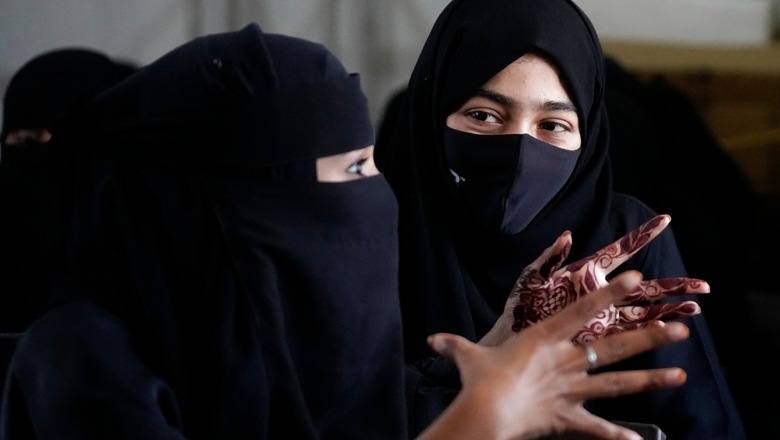
views
The issue of hijab, education and the future of the girls who are protesting against the court order banning hijabs in class takes me back to my pre-university days. We were a group of five friends — Shaesta, Rukhsana, Anita, Patricia and I. A friendship that went beyond what their names or religion were. We would often be teased as the “Amars, Akbars and Anthony” of the class.
Shaesta and Rukhsana were the studious ones, while we took their notes to complete ours. Shaesta wanted to be a lecturer in Political Science, Rukhsana had her sights set on being a pilot. Young and raring to go, we never once thought it was not achievable.
Both Shaesta and Rukhsana came from conservative Muslim families and would attend classes in the prescribed uniform — shirt and pinafore dress.
When we met them outside college hours, they would be seen in a black burkha with a beautiful brooch near the chin or sometimes in a hijab. Yet the veil did not change their aspirations, character or their beautiful smiles.
I would often ask them if they felt the need to dress differently and they would reply saying that it is their choice. Wearing the hijab is an essential practice in Islam, and Islamic teachings talk about covering important parts of the body, and they have grown learning to respect it.
I once asked Rukhsana: “How do you plan to go about your training? Do your parents support you?”
Tall, demure and angelic-faced Rukhsana confidently replied: “They know that I am really serious about training to be a pilot. I am sure they will be convinced. All you need to show is gumption.”
Shaesta was equally confident that her family would support her choice to be a lecturer. A year into our degree course, I received a wedding invitation from Shaesta.
Shocked, I called her up to wish her well. On the other end, I heard the sweet voice of my friend, but it had a defeatist undertone. “My parents found a wealthy and decent husband for me. He lives in the UAE. They wouldn’t let me continue my education as they felt that I would be over-qualified and not find a groom,” Shaesta said, adding that she would not be able to complete her degree.
I quickly dialled Rukhsana’s number to discuss what I felt was a complete let-down on the part of Shaesta’s parents.
Rukhsana had some advice for me in turn. “I understand the societal and familial pressures. But stand strong and Allah will do the rest. Don’t you ever give up on your dreams of being a journalist,” she said.
Fifteen years later, I met Rukhsana on board a private airline. She and her crew had safely flown 135 passengers from Mumbai to Bengaluru and I was one of them. I was bursting with pride to see my friend fly high and reach her goal.
Amid the raging hijab controversy, Rukhsana and Shaesta are two examples, both from extremely conservative Muslim families, but one where their lives took different turns.
Islamic scholars, social commentators, young girls who wear hijab and those who don’t, all agree – it’s a matter of choice.
Several of the hijab-clad girls I met in Udupi, Mangaluru and Bengaluru were of the opinion that it’s their cultural, religious upbringing and many prefer to follow it. Girls have been wearing a hijab to school or college, but they would remove it in the ladies’ room before attending class.
“An issue that could have been resolved inside a campus took an ugly turn as some groups wanted to further their political aspirations. I wear a hijab to college, but I follow the uniform. Those young girls have fallen prey to politicians,” said a young student from Kundapura, a district in coastal Karnataka.
Social commentators are of the opinion that if the hijab issue continues, it could mean young girls would either be locked out of schools or forced into Islamic educational institutions which would only deepen the social divide.
Today, a veil has clouded the thoughts and aspirations of many girls, torn between their religion and their future. But tomorrow, it is up to these girls to stand their ground and realise their dreams, just as Rukhsana did.
Read all the Latest News India and Breaking News here


















Comments
0 comment